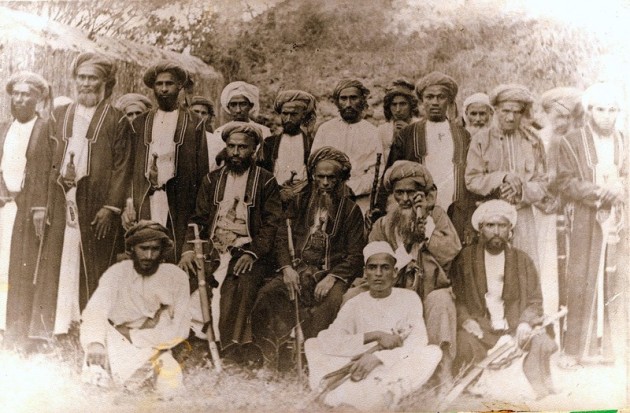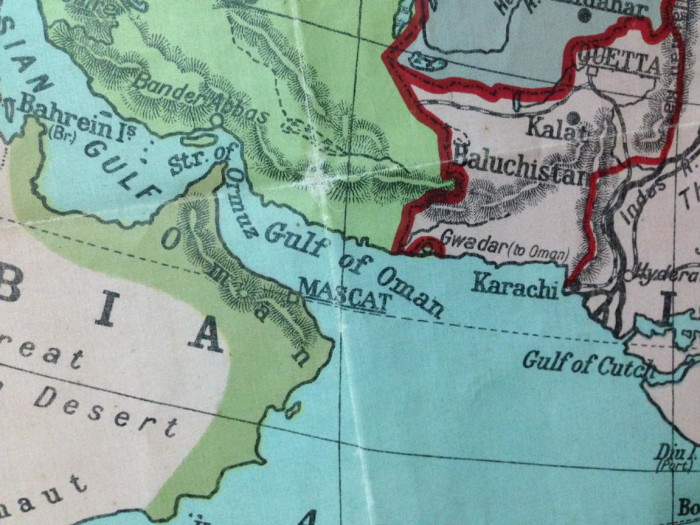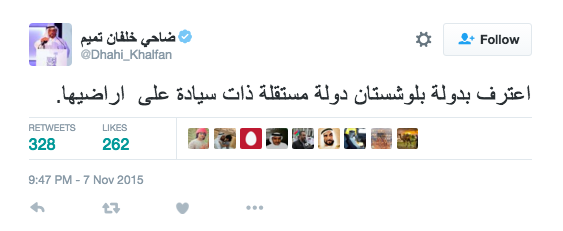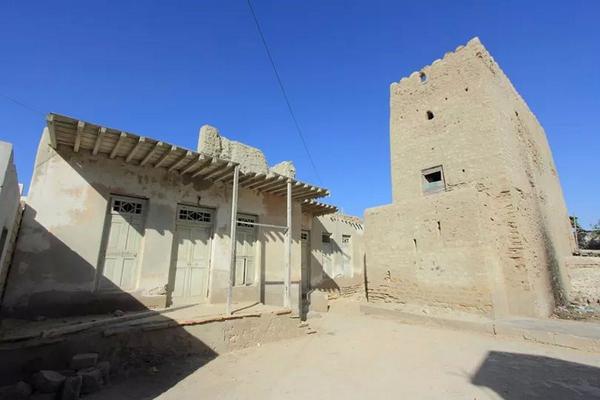
The first modern organized army unit in Oman was entirely Baloch in composition. Baloch loyalty to Oman is no secret as thousands of Baloch have laid down their lives in the defense of the Sultanate of Oman.
By Scott Erich
Above my desk in Muscat, a large classroom map of Asia hangs from two brass rivets. It’s an old map — yellowed, crinkled, and creased where it was once folded and kept in a teacher’s desk. While there’s no date listed on the map, it’s from sometime in the interwar years: in West Asia, the former Ottoman Empire is a patchwork of dotted lines and striped colonial holdings; in East Asia, the Japanese Empire includes the Korean Peninsula and Taiwan.
Oman is an amorphous green blob on the map encompassing the entire eastern coastal Arabian Peninsula, including what are now the Emirates and Qatar. To the west, it bounds up against the no-man’s land of “Great Arabian Desert.” Saudi Arabia had not yet formed — it’s labeled as the disparate regions of the Hejaz, Najd, Asir and Hasa — so the map must be from sometime before 1932, the year the Kingdom was united.
Looking north from Muscat’s shores across the Gulf of Oman, a smaller green blob is marked Gwadar (to Oman). Bright red political boundaries separate the city from its surroundings: the enormous expanse of British colonial India, which stretched from present-day Pakistan to Burma. The exclave of Gwadar lies due west of Karachi on the Makran coast of Pakistan, but on the map it is marked as being within Balochistan, one of three major regions delineated within in British India along with Nepal and Bhutan. But unlike Nepal and Bhutan, Balochistan never gained independence, and the local government remained a client-state of the Raj until partition in 1947, when it was incorporated into Pakistan.

The delineations of Balochistan and Oman’s possession of Gwadar are part of what attracted me to this map when I found it several years ago. People from Balochistan, or Balushis as they’re called here, form a large segment of the modern Sultanate’s society — some estimate as much as 35 percent of Oman’s population is Balushi, although most academics place the number at 15 percent. Omani Sultans owned the port of Gwadar for hundreds of years before eventually selling it to Pakistan for 5 million rupees in 1958. As with East Africa and southern Iran, ties between Balochistan and Oman predate the political link in the “golden age” of Oman’s overseas territories, and extend beyond the breakage of this link into the present day.
Like Pashtuns, Kurds, or Ghurkas, Balochis are often reduced to simplistic stereotypes as warriors and ardent defenders of their provincial homelands. Tenth century Arab geographers Al Muqaddasi and Ibn Hauqal called them a “bellicose and rapacious race of bandits,” having “no propensity whatsoever towards goodness; they have… stony hearts, fierceness, and hardness.” In the epic Shahnameh, medieval Persian poet Ferdowsi mentions Baloch multiple times as mercenaries of Sassanian kings.
Seven hundred years after these accounts, in the time of transition between the Omani Imamate dynasty that preceded the (present) Al Busaidi Sultanate, Imam Seif bin Sultan employed hundreds of Balochis to repel and displace enemies throughout the Persian Gulf and Indian Ocean, considering them “brave and well-armed with matchlocks.” At the end of the 18th century and early years of the Al Busaidi dynasty, would-be sultan Seyyid Sultan bin Ahmed fled to the then-backwater fishing village of Gwadar after a power struggle in Muscat. He remained in Gwadar for eight years as guest of the Khan of Kalat, Mir Nasir Khan Baloch, who allowed the exiled Omani royal to collect all revenue from the port. Then, in 1792, Seyyid Sultan made a triumphant return to Muscat as sultan, and kept Gwadar as his fortified dominion, reasoning that the Khan of Kalat’s initial gesture of hospitality was intended as a permanent gift.
After his death, Seyyid Sultan’s son Said bin Sultan inherited the throne and capitalized on the possession of Gwadar to equip the Sultanate with steady stream of Baloch fighters. “Said the Great” and his successors used these loyal mercenaries to consolidate power both in Oman and abroad. When Sultan Said moved his capital to Zanzibar, he was accompanied by Baloch soldiers who were sent to posts throughout East Africa to enforce the rule of local Omani governors. Back in Oman, Balochis guarded the strategically placed forts of the Sultan’s walis from warring tribes of the Omani hinterlands.
Throughout the 19th and 20th centuries, the British kept an eye on Gwadar, appointing a resident Political Agent to maintain relations with the Sultan’s governor and represent England’s financial interests in the port. They found a sympathetic ear in Sultan Said bin Taimur, who inherited a nearly ungovernable kingdom from his father who abdicated in 1932 and self-exiled to Bombay and later Karachi. Before partition, the British pondered how they might return Gwadar to their subject, Khan of Kalat, although these efforts ultimately proved unsuccessful. Then, in advance an official visit of Said bin Taimur to London in 1958, British Foreign Secretary Selwyn Lloyd resolved to wrestle the port from Oman once and for all, saying, “We must tackle [the Sultan] on Gwadur & Buraimi” in a cabinet meeting. The Sultan capitulated and sold the port to Pakistan in September of that year, with a rumored caveat that he would be able to continue to collect Balochis as recruits for the Oman’s military.
“The first modern organized army unit in Oman was entirely [Baloch] in composition,” writes J.E. Peterson, a scholar of Oman’s history.
The Muscat Levy Corps, as it was called, was created in 1921 and became the genesis of the Sultan’s Armed Forces. This unit, along with the Trucial Oman Levies, was integral to the British-backed Sultan’s victory over the Imam of the interior in the Jebel Akhdar war of the 1950s. British officers were tasked with training “boatloads of recruits from Gwadar” brought to camps at the foot of Jebel Akhdar, or “Green Mountain,” the Imam’s last stronghold.
In 1964 the Sultan’s Armed Forces were over 60 percent Baloch, and recruitment increased leading up to and during the Dhofar War in Oman’s southern province, which stretched throughout the 1960s and 70s. After the war, Balochis who fought for the Sultan remained and settled in Oman, blending into Omani society like so many merchants, traders, slaves, and soldiers before them.
Today, Balushi-Omanis maintain a strong presence in the security industry as soldiers, policemen, Ministry of Defense employees, and security guards. Many of the top officers in each military branch have Balushi heritage, like Major General Matar bin Salim bin Rashid al-Balushi, Commander of the Royal Army of Oman and Rear Admiral Abdullah bin Khamis al Raisi, Commander of the Royal Navy of Oman. A Facebook search of the surname “al Balushi” in Oman yields hundreds of profiles with public listings of jobs at the Royal Oman Police, the Royal Air Force of Oman, the Royal Cavalry, and so on. And the practice continues: as recent as 2014, the Omani government accepted applications to join the military from youth in coastal Balochistan.
Importantly, Balushi-Omanis are far more than just soldiers. Like any other group in Oman, they come from regionally and economically diverse backgrounds. On one hand, some of the most prominent businessmen in construction, manufacturing, and retail are of Balushi origin.
One of His Majesty’s top economic advisors, Muhammad Al Zubair, is a grandson of Baloch merchant Ali Al Hooti, who also advised two of Said the Great’s successors: Omani Sultan Turki bin Said and Zanzibari Sultan Barghash bin Said. The Zubair Corporation is one of the largest private companies in Oman, with massive holdings in real estate, construction, hospitality, and retail. Bait Al Zubair, the merchant family’s former home in Old Muscat, is now an impressive museum dedicated to Omani history and cultural heritage. On the other hand, many Balushi-Omanis work in professions considered to be at the lower echelons of Omani society like fishing, taxi driving, and truck driving. Since I’ve been in Muscat, several non-Balushis have shared well-worn stereotypes with me about accents, drug use, and insularity in these lower-income Balushi communities.
It would be easy for the uninitiated to visit Muscat and remain unaware of Balushi history or presence — but the signs would be all around them. Muscat’s largest and most popular tourist souq is in a historically Balushi neighborhood, and it’s not uncommon to hear Balushi-Omani shopkeepers speak to their migrant worker employees in Urdu, their shared lingua franca. In addition, many of the “traditional Omani” wares that are sold in the souq are of Baloch provenance — namely the much of the jewelry, hats, and elaborately embroidered women’s garments. Elsewhere, in the few bookstores that remain in Muscat, another sign jumps out at speakers of Arabic: political tracts on Baloch independence.

For obvious reasons, political writing of any kind is rare in Oman, particularly that which might be perceived as divisive or inflammatory. So you can imagine my surprise that several books on Baloch liberation are readily available at Borders and at semi-annual book fairs. With titles like The Baloch Awakening: Essays on the Baloch Question, The Baloch Question: Background and Contemporary Developments, and Baloch Nationalism: It’s Origin and Development, the books are Arabic translations by diaspora Baloch (including at least two Balushi-Omanis), and are rigorous, unapologetic treatises by activist-writers in support of a free Balochistan. Though the Omani government has an official policy of condemning violent movements of all kinds, the condoning of the sale of these books within the Sultanate is an interesting wrinkle in an otherwise no-tolerance policy.
Oman maintains unshakeable political, economic, and security relationships with Pakistan and Iran — both of whom face simmering separatist movements from a divided Baloch opposition. The Baloch Liberation Front (BLF) and Jundullah (PRMI) operate across the Pakistani-Iranian border, while the Baloch Liberation Army (BLA) focuses on Pakistan. The current ambassador of Oman to Pakistan is of Baloch heritage and Oman’s top military brass who regularly meet with their Iranian and Pakistani counterparts are also Baloch — signs that may signal Oman’s desire to gently nudge the two countries toward mediation of the Baloch conflict. Importantly, no Balushi-Omani officials have made comments like Dhahi Khalfan Tamim, the Head of General Security for the Emirate of Dubai, who publicly supported a free Iranian Balochistan last November.

Back in Gwadar, a new order is beginning to emerge. The port had already begun to fall into irrelevance before Omani withdrawal in the late 1950s, and sunk further into poverty for the remainder of the 20th century. Just as Omani and British eyes once looked to Gwadar as a strategic trade point, so now are the Chinese hinging their New Silk Road project on the remote port, once called “the most important city you’ve never heard of” by the New York Post.
China began developing the port in the early 2000’s but pulled out after their engineers were kidnapped and killed by Baloch separatists. After assurances from the Pakistani government, the Chinese came roaring back, securing a 40-year, US$46 billion contract to make Gwadar a western gateway for China to the rest of the world. The planned China-Pakistan Economic Corridor (CPEC) will connect China’s Xinjiang with Pakistan by rail, road, and pipeline through the Khunjerab pass and down the length of Pakistan to Gwadar. From there, China will be able to bypass the South China Sea and Strait of Malacca to export/import to/from other nascent projects for the new “Maritime Silk Road,” like the ports of Bagamoyo in Tanzania, and Duqm in southern Oman.
Still, fears loom about the threat of Baloch independence movements ruining China’s ambitions. But hard power isn’t the only tactic being used by Baloch nationalists to try and stall the project. In 2012, when the Chinese were beginning to restart the project, Balochistan province’s Chief Minister Aslam Raisani announced plans to gift 200 acres of land in Gwadar to His Majesty Sultan Qaboos as a “goodwill gesture.” The “government-to-government relationship is fine, but we want to revive the Balochi-Omani bond,” a retired official said on Chief Minister Raisani’s behalf. An American-based Baloch nationalist organization went one step further, and wrote a direct appeal to His Majesty, which was delivered to his representative in Washington Ambassador Hunaina Al Mughairy.
“Baloch loyalty to Oman is no secret as thousands of Baloch have laid down their lives in the defense of the Sultanate of Oman,” the letter read. After describing how the port project was initiated against the will of Balochis, it urged Oman to intervene in any way possible. This even included having the Sultanate claim “legal ownership over the historic port, as [we] have full faith in the government of Oman.” If His Majesty the Sultan should choose to entertain this request, a number of “Baloch freedom leaders” living in exile were listed as contacts. The first one is His Royal Highness the Khan of Kalat. Perhaps his forefather meant for Gwadar to be a permanent gift after all.
____________________________
Courtesy: Institute of Current World Affairs (Article was published on March 9, 2016)